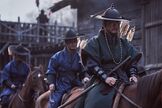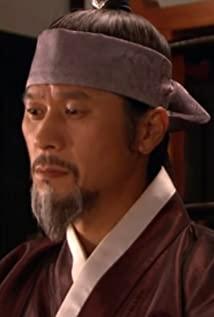For the original text, see The Paper: https://m.thepaper.cn/newsDetail_forward_13766444
"Kingdom: Asin in the North" is the prequel to the Netflix series "Kingdom" (see: Historical Drama | "Kingdom": Political History of North Korea in the Zombie Blockbuster ). In this prequel, the screenwriter Kim Eun Hee portrays a woman named "Axin (played by Jun Ji Hyun)" from the "Fan Hu" tribe, and uses her journey of revenge as a clue to explain the plague in "The Kingdom" The source of the spread of zombies. In the play, the girl Ashin discovers the secret of "Living and Death Grass". In order to avenge the genocide, she made zombies to wash the border town of North Korea and informed the North Korean medical officer Lee Seung-hee about the method, causing a bloody storm from the depths of the palace.
Ashin's life experience is the key to the whole story. She was born in "Fan Hu", which is what North Korea calls Jurchen people living near the border of the country. "Fan" means "fence". "The Revised Record of Xuan Zu" stated: "The Jurchen tribes scattered near the Cypriots are called Fan Hu." According to the "North Road Jilue" written by Zheng Yunrong (1792-1865), the origin of "Fan Hu" was stated, "Early Kingdom In Tuobianya, the Hu people who still live in the Jiangnei area because they can’t keep track of it, remain as Fan Hu. However, in the "Strategy for Victory", the tribes live either at the bottom of the city, within five or ten miles, or number Ten miles, forty to fifty miles away, or four to five breaths, a few days away." That is to say, the "fanhu" lived very close to North Korea, and even lived at the bottom of the city of North Korea, so these "fanhu" are also called "savages at the bottom of the city." "Chun Guan Zhi" stated: "While paying tribute to Beijing on weekdays, all the six towns in the North Dao (ie Zhongcheng, Wencheng, Huining, Qingyuan, Qingxing, Funing) are planted at the bottom of the city, so they are called the savages at the bottom of the city." Corresponding to the term "fan Hu", there is also the term "deep Hu", that is, the Hu people living far away from North Korea. In the late 16th and early 17th centuries, the Hercynian Jurchen Ula Department, which frequently clashed with North Korea, belonged to "Deep Hu". From North Korea’s point of view, a major use of the existence of the "Fan Hu" is that if the "Deep Hu" attacks North Korea, the "Fan Hu" can inform the country in advance and act as a strategic buffer. Fanhu people, without him, just want to follow me and discover the movement in the depths. But what I look for in Fanhu people is only one thing. Fanhu is between the two countries, and the accusation is on the other side. You are guilty of me". In the play, Ashin’s father wandered between the two, but was exterminated due to the betrayal of North Korean officials.
The terms "Fan Hu" and "Deep Hu" are terms based on the standpoint of North Korea, and "Fan Hu" actually belongs to the Warka tribe of Savage Jurchen (also known as Donghai Jurchen). After Nurhachi defeated the Hercynian Jurchen Ula tribe in the Wujieyan area in 1607, he asked North Korea for these Valkha Jurchens. According to the records of "Cabinet Tibetan Manchu Documents", "Congrui respectfully Khan (i.e. Nurhachi) writes to Emperor Wanli of the Daming Kingdom, and please pay attention to and return it to the people of the Warka tribe who lived along the border of North Korea when the former Jin Khan was dispersed. Emperor Wanli sent the King of Korea to investigate him and found out 1,000 households in the Varkha tribe who had been separated for several generations. Yu Congrui respected Khan and repatriated him in February of the 51-year-old year.” Although North Korea’s heart was not happy at this time, However, due to political pressure, these Jurchens were given to Nurhachi as a last resort.
For North Korea, wooing these Valkha Jurchens can provide an important guarantee for maintaining border security. Sejong Lee Sejong of Joseon (reigned from 1418-1450) in his later years began to grant them official positions and impose a custodial rule. In order to survive, Jurchens often donate soil to the King of Korea and accept honorary official positions. These Jurchens who accept North Korean official posts are also called "employed Jurchens." At that time, North Korea built the so-called "Peking Pavilion" in Hanyang City for the Jurchens who entered the city to live. During the reign of Shizu Li Yao (reigned 1455-1468), North Korea allowed the Jurchen chiefs to enter Hanyang City to see the king and grant official positions, which caused diplomatic friction with the Ming Dynasty. From the Ming Dynasty's point of view, this was North Korea's liaison with Jurchen, especially North Korea gave officials to Jurchens who had accepted the Ming Dynasty's appointment. This was an attempt to contend with the Ming Dynasty. Under a series of warnings from the Ming Dynasty, North Korea’s Jurchen policy was fundamentally shrunk in the late period of Li Yao's rule. Since then, the number of Jurchens entering Hanyang to donate soil has been drastically reduced.
The military strength of North Korea was quite impressive in the 15th century, and it was not as vulnerable as it was when the Imjin War broke out. Sejong Li Xi once ordered the Yuejiang River to attack the Jianju Jurchen tribe headed by Li Manju, and severely injured Li Manju. In 1467, the Ming court proposed that North Korea and the Ming Dynasty attack the Jianzhou Jurchen Tribe in the Pozhu River (Hunhe) area. Li Yao, who received the edict from the Ming Dynasty, quickly dispatched generals Kang Chun, Uonuma, Nan Yi and others to lead an army of 10,000 to attack Jurchen. Kang Chun led his army to the Jurchens' residence as scheduled, causing heavy losses to the Jurchens. According to the North Korean report, they beheaded hundreds of Jurchens, including Jurchen chief Li Manzhu and his son Gunaha, captured more than 20 Jurchen chiefs’ family members, and captured Dongning who was captured by Jurchen. Seven residents of Wei were sent back to the Ming Dynasty. The Ming court believed that "the king of Korea, Lee Piao, can send troops to help our division, kill offensive captives, and bring prisoners here. Loyalty is commendable, and sincerity must be a generous reward", so he rewarded North Korea. This series of battles left a deep impression on the Jurchens and caused them to have lingering fears about North Korea for a long time. In the play, when Ashin asked for help from North Korean officials at the border after suffering from the genocide, he called North Korea a "powerful country," and there is such a historical memory behind it. The so-called "Pozhuwei" in the play alluded to Jianzhouwei, and "Ali Duogan [Khan]" alluded to Nurhachi.
After the 16th century, North Korea’s military strength gradually declined, and its control over the Jurchens in the border areas also declined. Coupled with the harassment of the southern coastal areas by Japanese pirates, the situation of the "Northern and Southern Japanese" became more and more serious. In early 1583, the Jurchen chief Nitangjie, who lived in Huining, North Korea, caused the so-called "Nitangjie Rebellion" because he was dissatisfied with the prosecution of North Korean border officials. Although the war was extinguished by North Korea after more than half a year, North Korea’s prestige in the Jurchen tribe declined rapidly, and the Jurchens gradually stopped going to Hanyang to meet the North Korean king. At the same time, the power of Nurhachi of Jianzhou Jurchen Department expanded rapidly. Before the outbreak of the Imjin War, he had become one of the political figures not to be underestimated in the region. North Korea also learned of Nurha's rebellious and rebellious attempt to retaliate against the Central Plains through the reports of Ping An Road and Manpu District officials.
However, at the beginning of the 17th century, the Jurchen tribe that frequently clashed with North Korea on the border was not the Jianzhou Department headed by Nurhachi, but the Ulla tribe headed by Buchantai. However, the Ulla Department did not appear in the play. The screenwriter simplified the power struggle during this period to the triangle relationship between Jianzhou Jurchen, North Korea, and Varkha Jurchen. In fact, Buchantai attacked Zhongcheng, Tongguan and other places several times from 1603 to 1605, causing huge losses to North Korea and the Warkh people living in these places. So North Korea determined to retaliate, but due to a command error, the North Korean army was defeated by Buchantai. According to North Korea's Bibianji, "I have been defeated by hundreds of thieves by hundreds of times as many as I am." After this campaign, North Korea's prestige among the Valkha Jurchens plummeted, and it became more defensive in border defense. It should be noted that Buchantai also often mentioned the issue of appointment at this time. The Koreans abducted by Bu Zhantai in 1604 returned to China and reported to the imperial court, saying: "(Bu Zhantai) always used the matter of taking office as a statement, even though horses and skins can also go to Beijing to pay tribute. That is, Nurhaci) served in the celestial dynasty, Fan Hu also served in North Korea, but I am not allowed. If North Korea is allowed to take office, I will return all the captives before and after, otherwise Tongguan and Zhongcheng will be regarded as repeat offenders." North Korea As a last resort, he was granted the official position of the Central Government Affairs (Zheng Sanpin), and paid more salary. However, Bu Zhantai, who was given an official position in North Korea, did not stop the attack, but intensified. In fact, the Jurchens hope to obtain official posts in North Korea. The main goal is not to obtain the post itself, but the generous salary and rewards that the post brings. The cloth and other things produced in North Korea are what the Jurchens desire, and they are also needed by the Buzhantai tribes and other Jurchen tribes. Knowing this historical background, it is not difficult to understand the motives of Ashin’s father in the play who desperately hope to get a North Korean official position.
From the standpoint of the Varkhas, North Korea has been unable to protect the safety of the tribesmen, and Buzhantai treated the Varkhas quite cruelly, so refuge in Nurhachi may be one of the ways out. In 1607, Zemuthe, the Feiyou city lord of Valkha in the East China Sea, saw Nurhaci and said: "Our land is far away from Khan, so Buzhantebele, the lord of Shun Ula. He is very tormented, and we look forward to picking up our family members. In order to come back.” Zemuthe’s move laid a hidden danger to the relationship between the Jianzhou Department and the Ullah Department. Buzhantai could not sit by and watch Nurhachi expand his sphere of influence under his own eyes, and war broke out between the two sides. Nurhachi's army defeated the Buzhanthai army in Wujieyan area, and took advantage of the situation to gain control of the Varkhas. For Nurhaci, the Varkhas are a rare resource of troops and labor, so the State Construction Department will "even raid the islands, dig buried valleys, threaten and threaten, and so on." move. Some of the Varkhas were unwilling to be attached to Nurhachi, so they "slayed Chahu submergedly and went to the river to exterminate them", so much so that they cried to North Korea, hoping to live in North Korea instead of moving to Jianzhou. However, North Korea did not dare to accept these Varkhas, only "a little bit of salt and rice, so as to comfort them, as a show of compassion." After this war, the "all tribes and tribes on the border with North Korea will withdraw all at once", and the people of the six North Korean towns who had lived with the Varkhas also lost their dependence. Since then, North Korea has lost the "fan Hu" that can serve as a strategic buffer, and has begun to face the Jianzhou Nuzhen offensive.
However, some of the Varkhas who belong to Nurhachi are still informing North Korea about the situation if possible. In 1620, the Korean official Li Minhao, who was captured by the Nurhachi army in the Saarhu War, returned to his home country and presented the "Jianzhou Wenjianlu" to the court. The book mentioned that "the slaves used the feudal vassal to explain our country's speech." The three of them, Shouzhizha, the so-called benevolence must be the stable city fan Hu, whose parents can be a mourner for three years. Their love for our country is still unfailing, and whoever hears it will be sincere and not secretly informed. Ministers and so on, so get one or two." In other words, many of Li Minyu's accounts of Jianzhou are derived from the secrets of this "fanhu" Renbi. As an important material for understanding the situation in the rise of Houjin, the book has received considerable attention from the academic circles.
In the process of writing this article, I was helped by the historical consultant of "Kingdom: Ashin in the North", Mr. Li Xun (Koryo University Institute of Ethnic Culture). Thanks!
View more about Kingdom: Ashin of the North reviews









